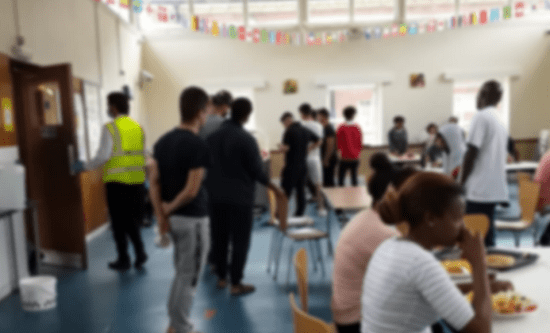
Mears Group PLC, an outsourcing company for ‘social housing’ management and repairs, took over the Home Office asylum housing contracts in Yorkshire and the North East in August 2019 from the notorious international security company G4S. Asylum housing was privatised in 2012 by the Coalition government, taking control of it away from local councils – and Mears has proven that its only aim is profit. In January 2019, the Tory government awarded Mears contracts for ten years, worth £1.15bn of public money. JOHN GRAYSON reports.
Profiting from misery
I have been inside dozens of houses working alongside refugee families to get Mears to do repairs. The Home Office gave Migrant Help, a refugee charity, the Advice, Issue Reporting and Eligibility Assistance (AIRE) services contract and a further £100m to run a repairs and advice line. It was a disaster – tenants waited hours or days to report major repairs. One house in Sheffield I visited over the winter of 2019, with four lone mothers and toddlers, was left with no heating or hot water for over a week.
On 3 July the government’s National Audit Office found that Migrant Help answered only 20% of repairs calls from September to December 2019. Only 2% were answered within 60 seconds; Migrant Help had said they would answer 90%.
There are around 48,000 people in asylum housing in Britain. Thousands of them had a miserable autumn and winter. Mears did not inspect many of their properties for months. I found tenants with rats in kitchens and bedrooms, cockroaches and leaking ceilings, and regularly flooded kitchens. This continued through the Covid-19 period. In June, I visited a tiny basement flat in Barnsley where a pregnant woman and her partner had been living since November 2019. Mears had not inspected the flat since December 2019. The flat was illegally rented; if there had been a fire there was no escape through their tiny window.
Covid-19 outbreak in Urban House
On 10 July, the BBC reported a major outbreak of Covid-19 at Urban House, an asylum hostel in Wakefield subcontracted from Mears by Urban Housing Services LLP.
From October 2019 to February 2020 Urban House was full, with around 300 residents. There were ‘overspill hotels’ throughout Yorkshire which at the peak in January had another 800 people staying. Some people had already spent three months in hotels when they transferred to Urban House in February. They received no money throughout this period; no money at all for their children’s sweets or toys or even for healthy food and toiletries. Urban House is supposed to be the place where people spend only three to four weeks being assessed and getting voluntary health checks before they are allocated family or shared housing to await the outcomes of their asylum claims. Many people were to spend five months in Urban House.
Hygiene has been appalling in Urban House during Covid-19; at first there was no soap in bathrooms or shower rooms. All the toilets are shared and only rarely cleaned. Masks and hand sanitiser appeared for the first time on 10 July only after the outbreak was confirmed. People have been forced to share rooms with strangers, two or three to a room.
Social distancing has never been possible even for those with high risk conditions like diabetes, asthma, heart and kidney disease, or strokes. There has never been special food for children, diabetics, people with coeliac disease, or pregnant women. Along with the Urban House Supporters Group, South Yorkshire Migration and Asylum Action Group (SYMAAG) has been organising a convoy from Sheffield with food, clothing and toiletries for the past six weeks.
Resistance in the Asylum System
Since January 2020 with my SYMAAG colleague and translator Manuchehr MD, I have had discussions with over 80 people from Iran, Iraq, Afghanistan, Kurdistan, and Myanmar living in Urban House.
For the first time in my experience there has been widespread resistance inside the asylum system. People have rejected the negligent and cruel regimes Mears has forced on them.
People have spoken out and we have recorded their voices through the independent media (mainly the Institute of Race Relations News Service), on our Facebook page and Twitter and through May Bulman’s coverage of Urban House in The Independent.
100 residents demonstrated outside the Migrant Help office in Urban House in December to demand that people be sent to asylum housing. Another action followed in January. Since then there have been petitions, food strikes and protests, demanding access to asylum housing where residents can safely self-isolate.
On 10 July, Urban House staff decided to start evacuating residents. 84 people were transported to housing across Yorkshire and the North East – none were tested. Local authorities were not notified, and over a week later there were no reports of any being tested in their current houses. On 14 July, after testing began on 12 July, it was announced that 35 people had tested positive. Around a hundred people are still (on 18 July) forced to stay in Urban House, terrified that they have contracted the virus.
This shameful, cruel treatment means profits for the massive property development Citrus group which owns Urban Housing Services LLP. Its millionaire CEO, Anton Curtis, is also one of the partners in the LLP, which also owns Stone Road IAC in Birmingham. Last year Curtis shared around £200,000 in personal pay-outs with the other partners.
Mears and other companies profit from public money and misery for people simply seeking a safe place to live.
John Grayson is an activist and researcher for South Yorkshire Migration and Asylum Action Group, a campaign against racism and for the rights of all migrants.
FIGHT RACISM! FIGHT IMPERIALISM! 277 August/September 2020




